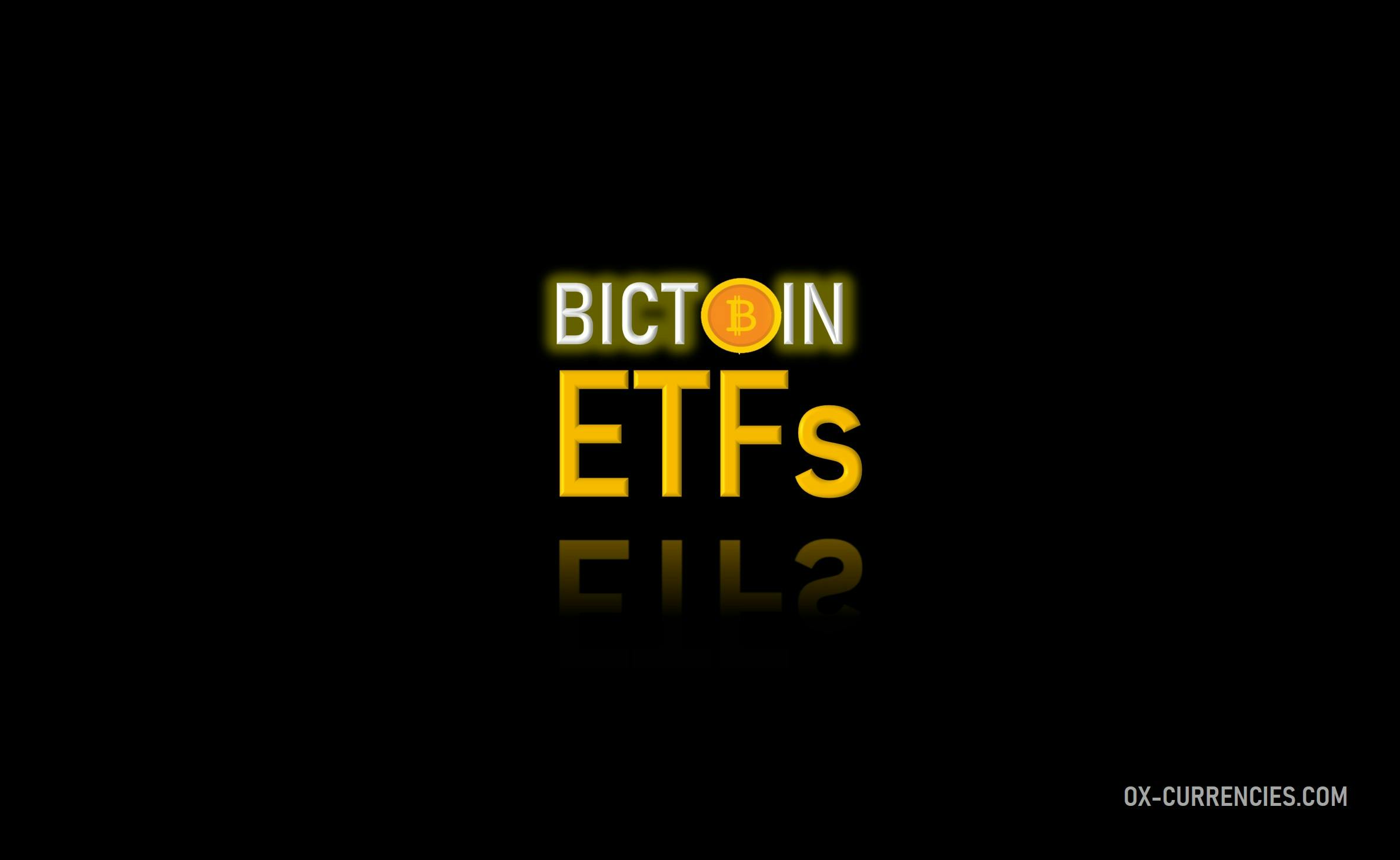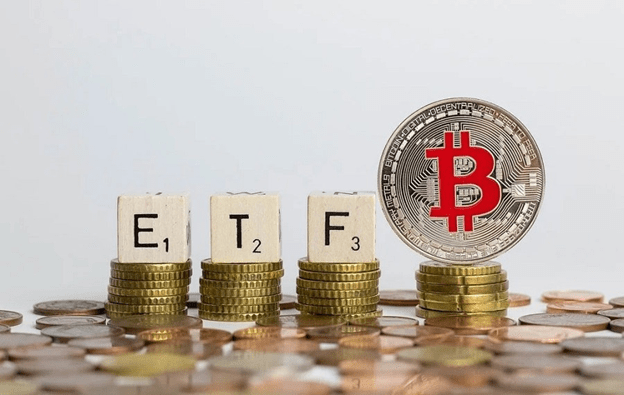
What Are Bitcoin ETFs
A Bitcoin ETF is an exchange-traded fund that analyses the price of Bitcoin and allows traders to buy and sell the securities on the Stock Market throughout the day.
ETFs are regulated conventional financial products that may be purchased using a variety of retail-friendly mobile trading applications such as Robinhood, Trading212, TD Ameritrade, and Fidelity.

Key Takeaways
• ETFs can hold more than one asset. A Bitcoin ETF, for example, might include Bitcoin, Tesla stocks, Twitter stocks, and other assets, giving investors a reduced-risk investment portfolio.
• Despite hundreds of applications from various firms in the past, including a second Winklevoss Twin ETF in 2018, one from Bitwise, and so on, the US Security and Exchange Commission refused to give their approval for Bitcoin ETF trading.
• Following the introduction of a Bitcoin ETF in North America and other recent events, the United States has given its approval for Bitcoin ETFs to commence trading next week.
SEE ALSO: 10 Best Crypto Exchange Traded Funds (ETFs) To Buy
SEE ALSO: The Most Influential Business People Driving Blockchain Adoption
ETFs, keep tabs on the most important stock indexes, such as the S & P 500 Index, as well as other assets such as diamonds.
Bitcoin ETFs have been debated strongly for many years since the Winklevoss twins’ “COIN” Bitcoin ETF application was rejected by the US Securities and Exchange Commission (SEC) in 2013.
A Bitcoin ETF was widely expected to usher in a new wave of institutional investment into the crypto industry, providing much-needed maturity and stability to the market.
Despite hundreds of applications from various firms in the past, including a second Winklevoss Twin ETF in 2018, one from Bitwise, and so on, the US Security and Exchange Commission refused to give their approval for Bitcoin ETF trading.
The SEC’s major reasons for their refusal to approve the Bitcoin ETF in the past have been that the Bitcoin market is highly volatile, and it does not have tangible fundamentals that back it up.
Following the introduction of a Bitcoin ETF in North America and other recent events, the United States has given its approval for Bitcoin ETFs to commence trading.
The SEC’s oversight of the sector may, in principle, stifle innovation. Because Bitcoin is such an open space, several things have become feasible. However, having the SEC take a more active role with its new chairman is not all negative news.
Gary Gensler, Chairman U.S. SEC has conducted seminars on the Bitcoin ETFs. It’s difficult to be opposed to anything once you comprehend and realize its potential.
Regulations are beneficial to the business, and he is experienced and capable of enacting wise and prudent regulations “says Ben Weiss, CEO, and co-founder of CoinFlip, the biggest supplier of cryptocurrency ATMs.
Furthermore, if the SEC had not approved Bitcoin ETFs, it would have been extremely damaging, limiting innovation in an area with a lot of promise. It’s hardly the most appealing image of the world’s leading capitalist civilization.
Pros of Bitcoin ETFs
1. Bitcoin ETFs are Convenient
The Bitcoin ETF allows investors to hold Bitcoin without having to know much about it, register on a cryptocurrency exchange, or deal with the high risks that come as a result of holding Bitcoin assets. A Bitcoin ETF cushions the effects of investing in Bitcoin.
2. Bitcoin ETFs are Diversified
ETFs can hold more than one asset. A Bitcoin ETF, for example, might include Bitcoin, Tesla stocks, Twitter stocks, and other assets, giving investors a reduced-risk investment portfolio. A Bitcoin ETF, similarly, would allow investors to trade on different assets through regulated market exchange.
3. Bitcoin ETFs are Tax Efficient
A Bitcoin ETF trading on regular exchanges would almost certainly be regulated by the SEC, ensuring tax efficiency and qualifying for tax breaks.
Cons of Bitcoin ETFs
1. Bitcoin ETFs Have High Management Fees
ETFs frequently charge management fees to investors in exchange for the lower risk of investing that they provide. As a result, purchasing a reasonable number of shares in a Bitcoin ETF will lead to paying very high management fees in the long run.
2. Bitcoin ETFs Cannot Engage in Cryptocurrency Trading
Bitcoin may be traded for other cryptocurrencies, such as Cardano and Litecoin. The Bitcoin ETF, on the other hand, would not be eligible to trade for other cryptocurrencies since it is not a cryptocurrency but an investment fund that monitors everything that has to do with the price of Bitcoin.
Bitcoin ETFs Impact in the Crypto Space
In the Bitcoin ecosystem, there has been considerable worry that ETFs might make life more difficult for many independent Bitcoin exchanges and businesses.
Much of the trade community harbors an anti-Wall Street attitude. As a result, if crypto is centralized at the institutional ETF level, there may be a reaction.
“The purpose of Bitcoin is to allow you to keep your coin. However, there is a place for every type of firm and participant in the market, with as much access as possible.
I believe that people should own their coins, but for those who cannot, such as pension funds, ETFs will not control the market” Weiss explains.
Weiss dismissed worries about short sellers as well, correctly pointing out that shorting cryptocurrency has seldom been a lucrative investment.
SEE ALSO: 7 Best Platforms for Bitcoin Loans with Low-Interest Rates
Frequently Asked Questions (FAQs)
1. What effect will the Bitcoin ETF have on the price?
The ETF’s price will not be linked to the price of Bitcoin.
A futures-based ETF follows futures contracts rather than asset prices. As a result, a Bitcoin ETF based on futures contracts would monitor Bitcoin futures contracts rather than the price of Bitcoin itself. As a result, the ETF’s price will not track the price of Bitcoin.
2. What Exactly are Bitcoin Futures?
Bitcoin futures allow investors to acquire exposure to Bitcoin (BTCUSD) without actually owning the underlying cryptocurrency. They function similarly to commodities or stock index futures contracts in that they enable investors to speculate on the cryptocurrency’s future price.
3. Are ETFs suitable for beginners?
Exchange-traded funds (ETFs) are perfect for beginners because of their numerous advantages which include low expense ratios, ample liquidity, a wide variety of investment options, diversification, a low investment threshold, and so on.
SEE ALSO: 16 Countries where Bitcoin is Illegal to Trade or Mine
Final Thoughts
Bitcoin ETFs are starting to get the recognition that they deserve and with the U.S. Security and Exchange Commission giving its approval recently after so many rejected proposals just proves that it’s only a matter of time before Bitcoin ETFs becomes accepted all over the world.
Read More




